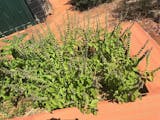Liquorice is a perennial culinary, tea and medicinal plant, also known as licorice, which originally comes from Western Asia and the Mediterranean region. The diverse traditional herbal medicine has been known in Chinese medicine since 2800 BC and was also considered a classic remedy in Tibetan medicine. The plant is known for the candy licorice obtained from its woody and yellow roots and has other diverse areas of application. The ancient Greeks and Romans valued it as a good expectorant for coughs and sore throats; today it is only known as licorice and tea. The frost-sensitive plant grows primarily in dry places, in bushes and on sandy or clay soil. Chewing the dried licorice sticks is beneficial for dental care.
General information
Plant family: Fabaceae
Life cycle: Perennial
Days to harvest: 100 days
Plant height approx.: 150 cm
Root type: Deep rooter
Nutrient requirements: Medium eater
Water requirements: Low
Winter hardiness: Up to 3 °C
Location: Sunny
Soil: Permeable, deep, loamy, sandy, humus
pH value: 6 to 7
Sowing and planting information
Germ type: Dark germinator
Sowing depth: 0,5-1 cm
Optimal germination temperature: 20-25 °C
Germination time: 14-40 days
Plant and row spacing: 50x50 cm
Optimal mixed culture:
Unfavorable mixed culture:
Subtropic climate (Mediterranean) (e. g. B. Portugal, Spain, Italy)
Direct sowing possible all year round, preferably from March to September. We recommend pre-cultivation in small pots from February to June.
Moderate climate (e. g. B. Germany, Switzerland, Poland)
Direct sowing possible all year round, preferably from April to July. We recommend pre-cultivation in small pots from March to June.
General
Sow directly in rows. When pre-cultivating, sow the seeds in small pots and let the seedlings grow to the first visible licorice leaves. Then plant the pregrown plants from the pots directly into the open field. The seedlings are planted in the bed from the 2nd pair of leaves after the cotyledons.
Liquorice prefers a sunny and warm location with a permeable, deep, nutrient-rich, humus-rich and sandy loam soil. Prepare the soil with seasoned animal manure. Avoid waterlogging.
Additional tips
The plants tolerate dry periods well. The roots form long underground runners. The roots are harvested from the 4th year onwards. In order to quickly obtain a fine, crumbly and permeable soil, we recommend additional incorporation of biochar and primary rock powder.
Type of propagation
It spreads via seeds or cuttings.
Plant care
On very hot days, additional watering is recommended to keep growth stable. Beds prepared with animal manure and planting in mixed culture replace additional fertilizer.
Germination ability of seeds: 3-4 years
Other Names
Botanical names: Glycyrrhiza glabra
English names: Licorice
German names: Süßholz, Lakritze
Portuguese names: Alcaçuz
Spanish names: Regaliz
French names: Réglisse



![Licorice [Glycyrrhiza glabra]](http://www.benjis.net/cdn/shop/files/Suessholz-Lakritze-Licorice-Alcacuz-Glycyrrhizaglabra-www.benjis.net.jpg?v=1710349192&width=1445)





